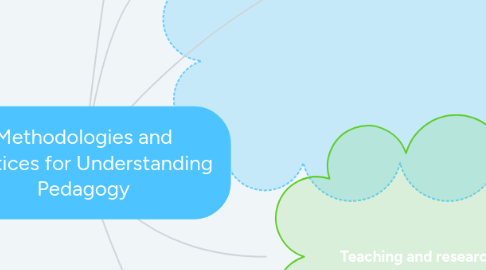
1. Observation object. · Observation objectives. · Total time and frequency of observations. · Number of observers. · Type or types of observation to be used. If it is a structured observation, the following will also be required: · Dimensions and indicators to be observed and forms of data recording.
2. Understanding of pedagogy
2.1. set of values oriented to training intentions
2.1.1. Research as a strategy Variety as opportunity Knowledge as a problem Research as a process the Question as a method
2.1.2. Dimensions of pedagogy for understanding
2.1.2.1. epistemological
2.1.2.1.1. explains the relationship between the who and the what.
2.1.2.2. teleological
2.1.2.2.1. understand human behavior in the social context of the classroom
2.1.2.3. axiological
2.1.2.3.1. underwriting securities underlying the justification of the activities that take place in the classroom
2.1.2.4. ontological
2.1.2.4.1. cognitive, emotional and behavioral aspects of the protagonists of the school event
2.1.2.5. methodological
3. Teaching and research
3.1. Teaching leads to research and this leads to teaching
3.1.1. The skills to be a good teacher and the skills to be a good researcher are positively correlated
3.1.2. CONCEPTION OF EDUCATION
3.1.2.1. The teacher is prepared so that the student is actively involved in learning.
3.1.3. CONCEPTION OF LEARNING
3.1.3.1. Learning is understanding, meaning and a way of interpreting the world
3.1.3.1.1. approaches to learning
4. Research and practice
4.1. Educational research investigates from an internal perspective, that is, part of teaching practice itself
4.1.1. reflection and action are essential elements for training processes
4.1.2. When a teacher continuously observes his practice, he reflects on it
4.1.3. The teacher or professor who investigates will be a role model for their students
4.1.4. Educational research, as it is also called, has been developed from the application of the scientific method to the study of pedagogical problems
4.2. Approaches and methods of pedagogical research.
5. The classroom as an educational context.
5.1. Vygotsky tells us that the child's intellectual development cannot be understood as independent of the social environment in which he is immersed
5.1.1. Contents of the subjects
5.1.1.1. interest and / or enthusiasm
5.1.1.2. rage and / or impotence
5.1.2. Methodologies used by the teacher
5.1.2.1. didactics, good teaching practices, participation
5.1.3. Relationship with the teacher, perception that he or she has the student
5.1.3.1. feelings, recognition of efforts, show of interest, good treatment
5.1.4. The student's relationship with classmates
5.1.4.1. union, friendship, camaraderie, equality
